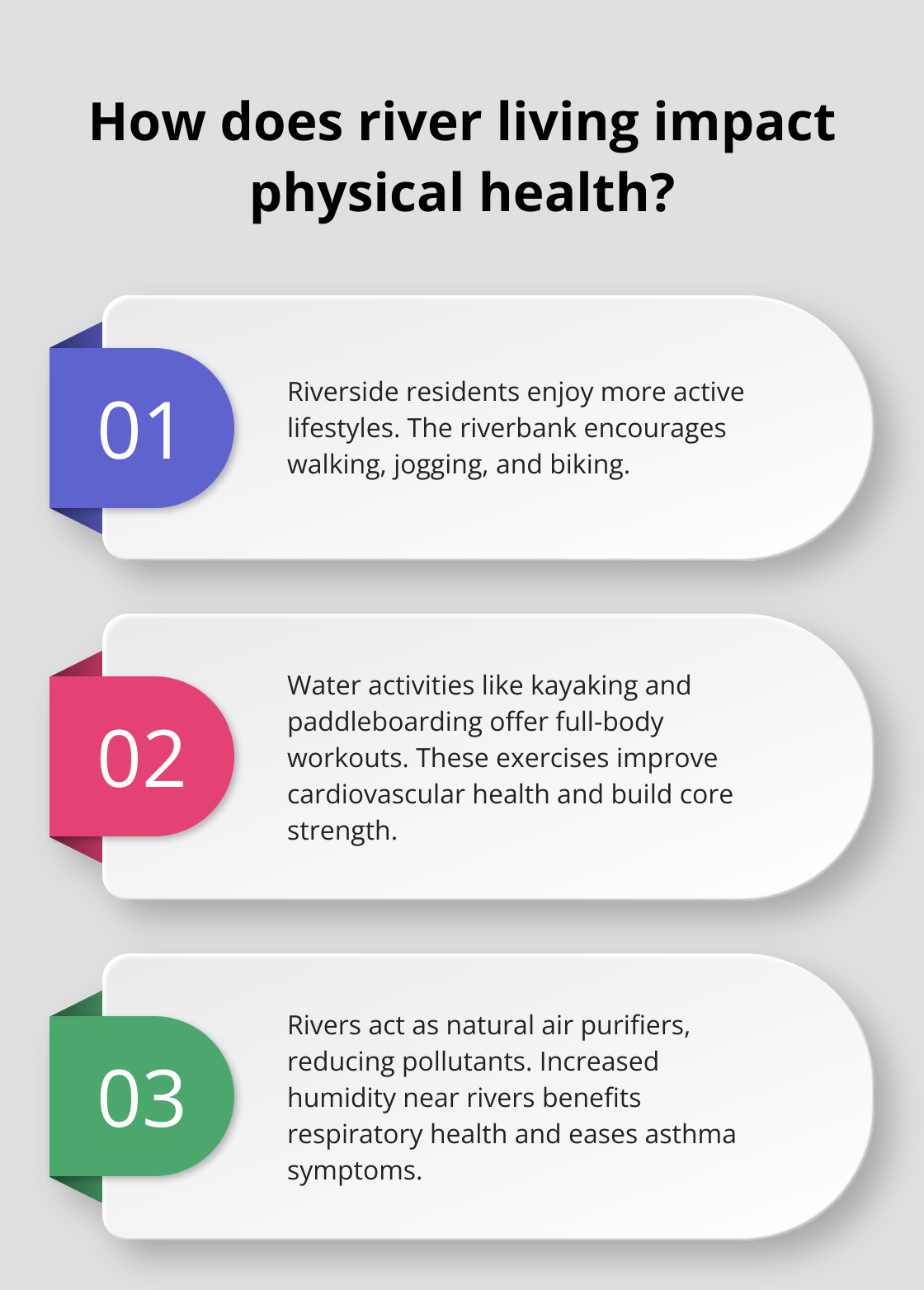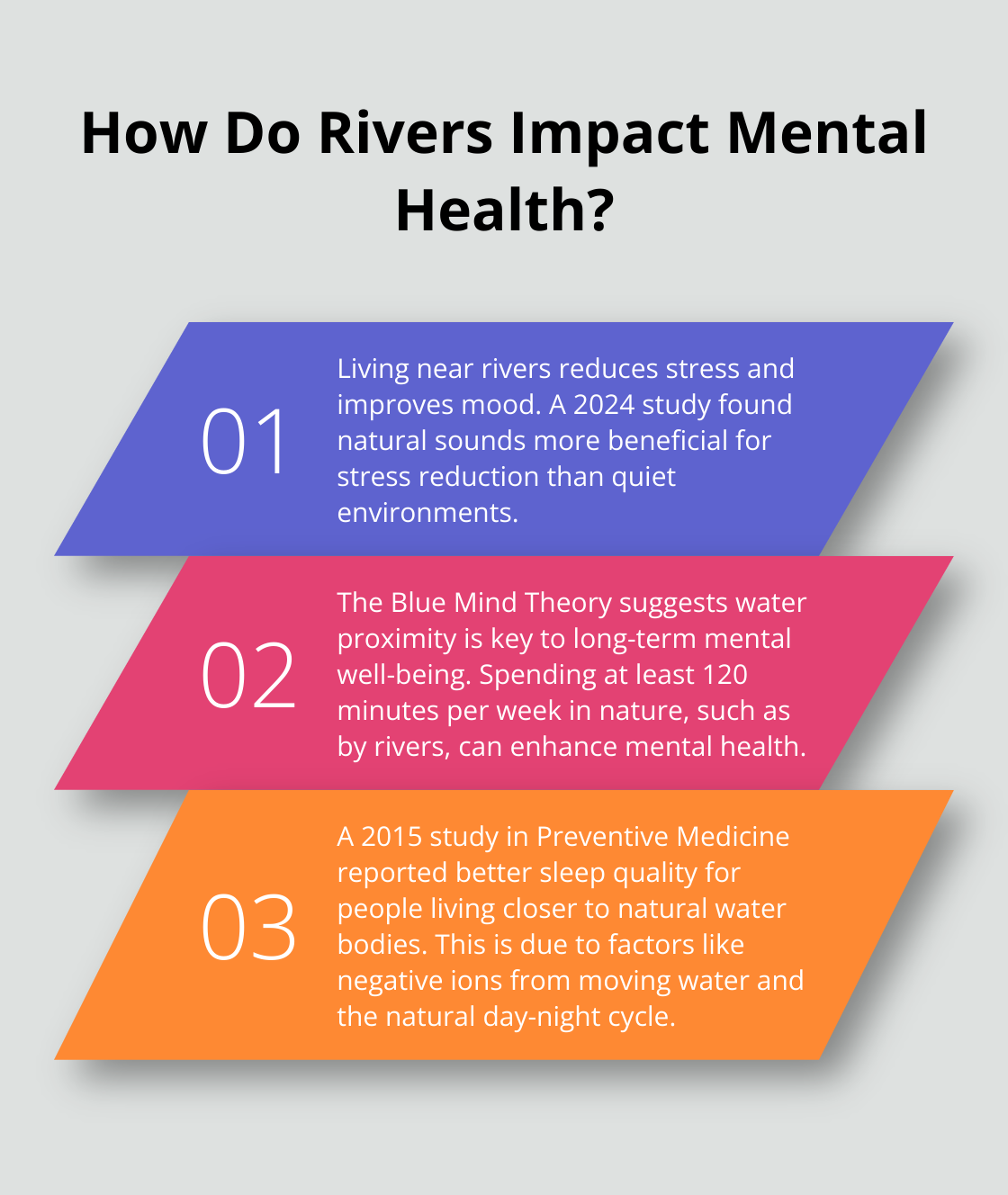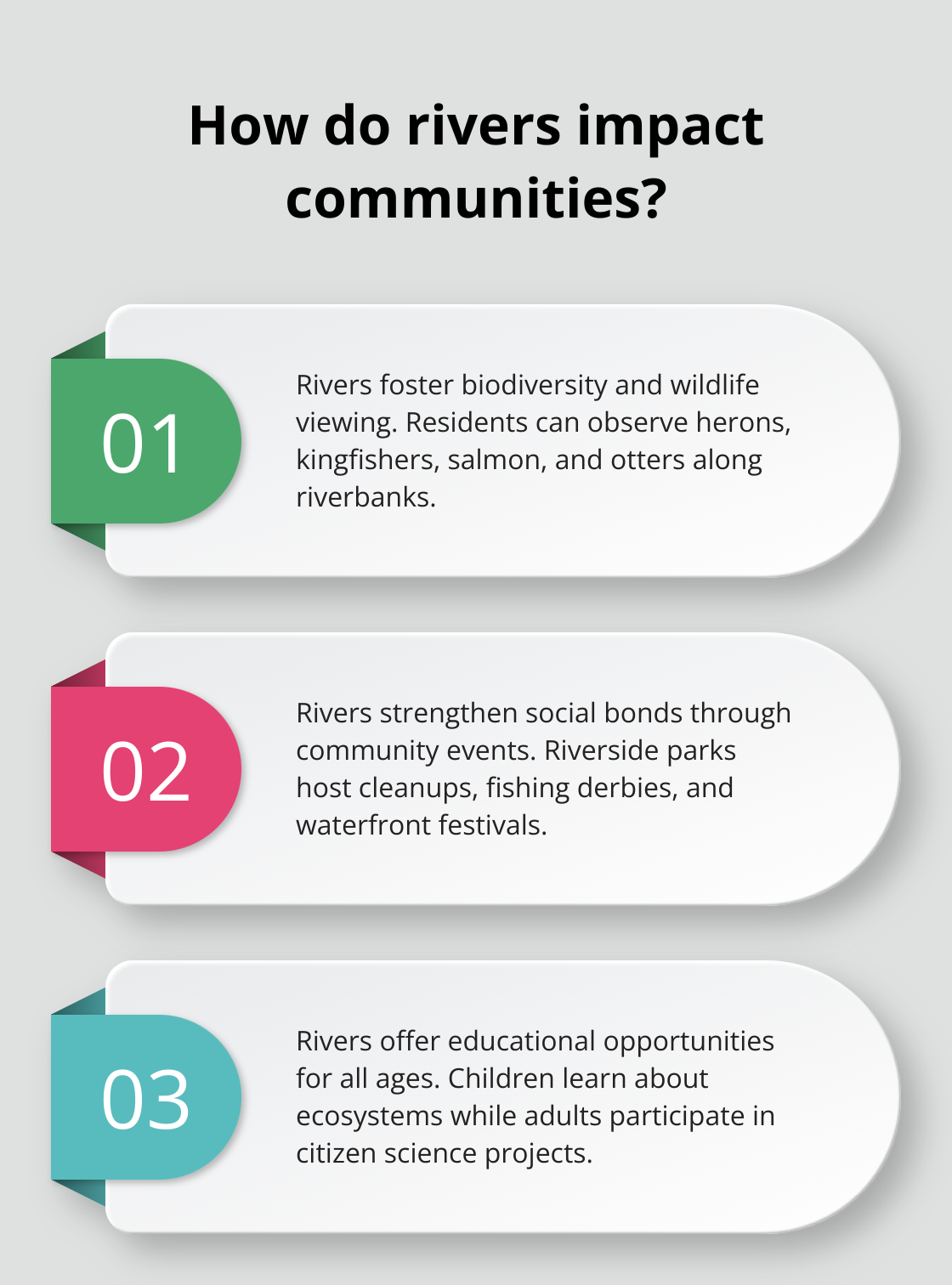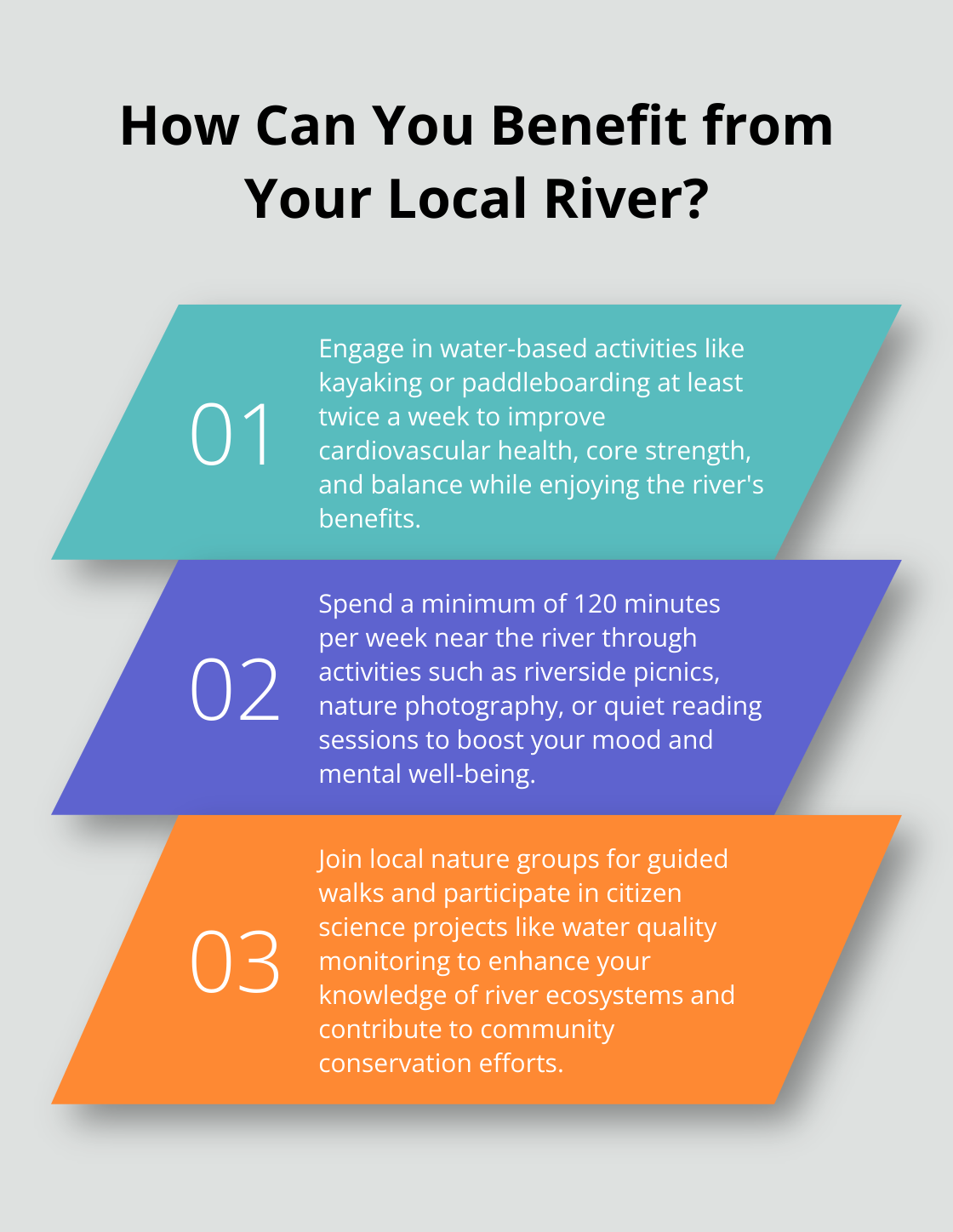Rivers have long been the lifeblood of civilizations, offering more than just scenic beauty. At Global Positive News Network, we’ve explored the positive impacts of living near a river on health and well-being.
From boosting physical activity to enhancing mental health, riverside living offers a wealth of benefits. This article delves into the ways river proximity can improve your life and the environment around you.
How River Living Enhances Physical Health
Living near a river offers more than scenic views; it provides a gateway to improved physical health. Riverside residents often enjoy a more active lifestyle, breathe cleaner air, and have access to nutritious local food sources.
River-Inspired Fitness Opportunities
Rivers create natural playgrounds for physical activities. The riverbank invites people to walk, jog, or bike regularly.
Water-based activities like kayaking, canoeing, and paddleboarding offer full-body workouts. These low-impact exercises improve cardiovascular health, build core strength, and enhance balance. For those who prefer calmer pursuits, fishing provides a way to stay active while enjoying the river’s tranquility.
Cleaner Air by the Water
Rivers act as natural air purifiers. The flowing water helps circulate air and reduce pollutants. Evidence suggests that cold and humid air at the riverside alters the local air circulation, enhancing the flow of air away from the area.

The increased humidity near rivers also benefits respiratory health. It keeps airways moist, which reduces the risk of respiratory infections and eases symptoms for those with asthma or allergies.
Fresh Fish: A Local Health Boost
River proximity often means easy access to fresh, locally-caught fish. Fish (an excellent source of omega-3 fatty acids) is crucial for heart and brain health. The American Heart Association recommends eating fish at least twice a week to reduce cardiovascular disease risk.
Local fish markets or community-supported fisheries frequently emerge near rivers, providing residents with sustainable, nutrient-rich food options. This direct access to fresh fish not only supports physical health but also promotes a connection to local food systems and traditional fishing practices.
As we explore the physical health benefits of riverside living, it’s important to consider how this environment affects our mental well-being. The calming presence of flowing water and the natural surroundings can have profound effects on our state of mind.
How Rivers Boost Mental Wellness
Rivers offer more than scenic beauty; they provide significant mental health benefits. Research confirms that living near rivers can reduce stress, improve mood, and enhance sleep quality.
The Calming Effect of Flowing Water
Natural sounds were found more beneficial for stress reduction than quiet environments, according to a 2024 study. Riverside residents can enjoy this benefit daily by simply opening a window or taking a short walk along the riverbank.
Nature’s Mood Enhancer
Being close to water may be key to long-term mental well-being, according to the Blue Mind Theory. The effects of water on mental health are astonishing, as suggested by research from October 2023.

To reap these benefits, try to spend at least 120 minutes per week in nature. You can achieve this through riverside picnics, nature photography, or quiet reading sessions by the water.
Improved Sleep Quality
Proximity to rivers can significantly enhance sleep patterns. A 2015 study in Preventive Medicine reported better sleep quality for people living closer to natural water bodies. This effect stems from a combination of factors:
- Negative ions produced by moving water
- The natural day-night cycle experienced near rivers
- The overall calming environment
To improve your sleep, consider incorporating a pre-bedtime river walk into your routine. The exercise, fresh air, and natural sounds will prepare your body and mind for restful sleep.
Stress Reduction Through River Activities
Engaging in river-based activities can further amplify the mental health benefits of living near water. Fishing, for example, combines the calming effects of nature with mindfulness and patience (skills that can transfer to other areas of life). Kayaking or canoeing provides both physical exercise and a chance to connect with nature, which can significantly reduce stress levels.
Rivers create unique environments that support mental well-being in multiple ways. The next section will explore how these waterways not only benefit individual health but also contribute to thriving communities and ecosystems.
Rivers Foster Thriving Communities
Rivers do more than benefit individual health; they create vibrant ecosystems and strengthen community bonds. These waterways serve as natural hubs for biodiversity, social interaction, and learning opportunities.
A Haven for Wildlife
Rivers teem with life, offering residents a front-row seat to nature’s spectacle. Birdwatchers can spot herons, kingfishers, and ospreys along riverbanks. Fish like salmon and trout attract both wildlife and anglers. Otters, beavers, and muskrats often make their homes near rivers, providing exciting glimpses for patient observers.

To maximize wildlife viewing:
- Invest in a good pair of binoculars
- Learn to identify local species using field guides or apps
- Join local nature groups for guided walks and shared knowledge
Building Stronger Social Ties
Rivers naturally attract people, fostering a sense of community. Riverside parks and trails become meeting points for neighbors. Community events like river cleanups, fishing derbies, and waterfront festivals strengthen social bonds.
Blue spaces have demonstrated potential health benefits, particularly in terms of greater positive moods, including feelings of esteem and vigor, and improved mental well-being.
Learning Beyond the Classroom
Rivers provide invaluable educational experiences for all ages. Children can learn about ecosystems, water cycles, and conservation firsthand. Adults can participate in citizen science projects, monitoring water quality or tracking wildlife populations.
Many riverside communities offer educational programs:
- River ecology workshops
- Guided nature walks
- Kayaking or canoeing lessons
- Historical tours highlighting the river’s role in local development
These programs not only educate but also instill a sense of stewardship for the river and its surroundings.
Rivers unite communities and inspire environmental awareness. From volunteer-led restoration projects to intergenerational fishing programs, rivers continue to play a vital role in shaping positive community experiences.
Final Thoughts
Living near a river offers numerous benefits for physical and mental well-being. Rivers provide opportunities for exercise, stress reduction, and improved sleep quality. These waterways also play a vital role in fostering vibrant communities, supporting biodiversity, and offering educational experiences for people of all ages.

The positive impacts of living near a river extend beyond individual benefits to the entire ecosystem and community. We at Global Positive News Network encourage you to explore the rivers in your local area. You can take a walk along the banks, participate in water-based activities, or join community events to enhance your quality of life.
Every interaction with a river allows you to appreciate its value and contribute to its preservation. You can learn more about community initiatives and environmental conservation at Global Positive News Network. Together, we can spread hope and positivity while working towards a healthier, more connected world.




